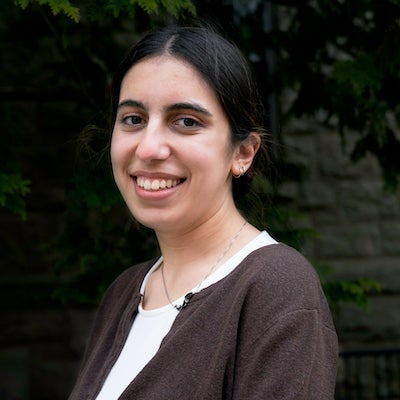Majors: Anthropology and Biology
Hometown: Kingston, RI
Q. What makes the College of Arts and Sciences at URI unique?
A. It has many great professors that provide a wide range of resources to students. Students are able to take many diverse classes that meet their interests within the College of Arts and Sciences. I have taken many classes that suit my interests, or were required for my majors — from physics, to philosophy, to anthropology — all within this college. All of these courses were with great professors who care about the material they teach, and their students.
What accomplishments and/or activities at URI are you most proud of now?
I am most proud of receiving a Coastal and Environmental Fellowship. This fellowship in the Wildlife Genetics and Ecology lab with Dr. McGreevy and Dr. Beltrán allowed me to become involved with research as an undergraduate, and gain experience presenting my own research. Being a Coastal and Environmental Fellow helped me grow as a scholar through giving me valuable experience working in a lab.
What research projects, internships, experiential learning, and/or study abroad programs did you participate in at URI?
At URI I was a part of the Coastal and Environmental Fellowship program. My fellowship was in the Wildlife Genetics and Ecology lab with Dr. McGreevy and Dr. Beltrán. There I studied the genetic diversity of the eastern cottontail rabbit and its competing species the New England cottontail rabbit. My fellowship project focused on the phylogeographic of the New England cottontail to examine species diversity and location to determine where they compete with the eastern cottontail rabbit and where conservation efforts should be focused. As a part of the fellowship I presented my project at the Undergraduate Research Symposium. Being a Coastal Fellow gave me experience completing lab work, collecting data, and conducting my own research project, as well as gave me confidence in presenting my research project.
I have really enjoyed my time working in the WGEL, and the relationships I have with my PI’s and my coworkers in the lab. I have even been able to continue working in the lab as an undergraduate lab assistant after my Coastal and Environmental Fellowship ended in December 2021.
What do you value about your liberal arts education?
I value my liberal arts education greatly, it has given me opportunities that may not have been as accessible through focusing solely on environmental and life sciences. My liberal arts education provided me with diverse knowledge of a range of subjects that has made me a more well rounded person. I have learned from many great professors who were truly interested in the subjects that they teach, and who were committed to sharing their knowledge and curiosity with their students. Taking anthropology courses has allowed me to examine myself as a human and the biological and cultural phenomena that have shaped us.
What have been some highlights of your time in the Anthropology department? How did this major complement your studies in biology?
One of the highlights of the Anthropology Department at URI is that it is a very close knit community. I have shared classes with almost everyone from the Anthropology major and made many friends over the past 4 years.
My Anthropology major greatly complements my studies in the College of Environmental and Life Sciences as a Biological Sciences major. I am interested in studying evolution, learning about it from both a biological standpoint, and a cultural perspective really enhanced my understanding. It gave me insights into human evolution and behavior that have only encouraged me to keep learning more.

